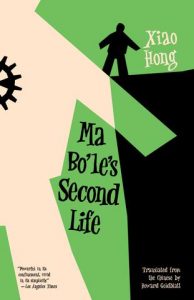Book Review
Americans frequently fail to realize the searing impact of the Second World War on China. Yet, Japan’s bloody occupation continues to influence Chinese artists and thinkers in books and films more than seventy years later. This makes Xiao Hong’s novel Ma Bo’le’s Second Life all the more remarkable as it was written by Ms. Hong in 1940 during the occupation, and two years before her death at the age of thirty. The novel paints a vivid portrayal of occupied China, but it also plays with the ideas of authorship and translation. Ma Bo’le’s Second Life is a clever excursion into the gray area where original work and translation meet.
Hong’s novel is not about the grand sweep of history, but rather the story of one man’s day-to-day struggles during the war. Ma Bo’le is the adult son of a prosperous Chinese convert to Christianity, yet he is unable and unwilling to enjoy his life:
For some reasons only he could fathom, Ma Bo’le hated pretty much everything about his opulent surroundings. His home life was lackluster, dreary, and irremediably dull. It was debilitating. Any young man experiencing it over a long period of time would waste away, vegetate, stagnate under the moss. It was the sort of home that screws up a young man’s head.
Ma Bo’le proves to be very “screwed up” indeed. He lives with his wife and three children in his father’s family compound, but he is too self-involved to play any meaningful role in his family. He lives in the shadow of his overbearing father who was once “the quintessential Chinese Mandarin,” but since converting to Christianity, praises all things from the West:
Mr. Ma’s credo was: Western things are better than Chinese things. Western children are plumper, Western women are more accomplished, Western drinking glasses are more durable, and Western textiles are unmatched anywhere.
Hong uses Ma Bo’le to criticize Chinese society in the early war years. His fixation on things Western and his hatred of his own people suggest a fractious nation ripe for conquest. In fact, when the war between Japan and China begins in 1937, Ma Bo’le heartlessly leaves his wife and children and returns to Shanghai, almost anxious to become a refugee. He lives in appalling poverty in a windowless room, waiting for the war to overtake him, spending his “nights trying to determine what fate had in store for him.”
But before the Japanese attack Shanghai in August 1937, his wife and three children rejoin Ma Bo’le. His wife bears him no ill will, knowing his connection to his family is the only way she can survive the war. A sense of normalcy returns, but it is only tentative. In wartime, Shanghai’s population is constantly tense; the sense of impending disaster is palpable. Ma Bo’le grows gloomy, proclaiming, “Life is nothing but meaningless hustle and bustle.”
When the family is forced to flee to western China, which has been spared from the war, thousands of people in Shanghai have the same idea. As Ma Bo’le and his family wait for a train, they are separated at the Song River Bridge and it is only luck that reunites them. However, complications resume. Living in a house owned by old friends of Ma Bo’le’s father, the Wang family, Ma Bo’le soon falls in love with their unmarried daughter. For Ma Bo’le, the “burden of family . . . exacerbated by unstable living conditions on the road and fears of his immediate future, stoked the fires of romantic liaisons, a throwback to his carefree days in Shanghai.”
But the realities of being a refugee prevent Ma Bo’le from fulfilling his desires as his family is forced, once again, to flee from the Japanese. Conditions worsen as food grows expensive; Ma Bo’le attempts to sell buns in the street, but fails to turn a profit. He meets a Japanese expatriate living in China—a teacher of Esperanto—and in keeping with Ma Bo’le’s lack of practicality, he focuses all of his attention on learning this international language that no one speaks.
In addition to the detailed life of Ma Bo’le during the occupation, the novel is framed by introductory and concluding chapters that take place in the 1980s, long after the author’s death. It is at this point that the astute reader of Ma Bo’le’s Second Life may realize the sleight of hand of the translator, Howard Goldblatt. Goldblatt explains in his afterward that the original Ma Bo’le novel was never completed by Xiao Hong. The work in progress was serialized in newspapers before her death, but never finished. Goldblatt not only translated the work, but created the contemporary frame chapters: the beginning and end. This explains the title: the translation gives the novel a contemporary perspective, a literal second life. In the process, the contemporary chapters frame the war in the grander sweep of Chinese history. When we learn the fate of Ma Bo’le and his family, we understand more fully the devastation that the Second World War brought to China.
This novel also reminds us that translation is always an act of creation, and in this fascinating and engaging work, Goldblatt takes this premise to its logical extreme. In the end, Ma Bo’le’s Second Life is a fusion that defies easy categories as the original Chinese work and the English translation encounter each other in an unusual and creative harmony.
About the Reviewer
Eric Maroney has published two books of nonfiction and numerous short stories. He has an MA in philosophy from Boston University. He lives in Trumansburg, New York, with his wife and two children. His book of nonfiction prose, fiction, and poetry, The Torah Sutras, will be published by Albion-Andalus Books in 2019.
